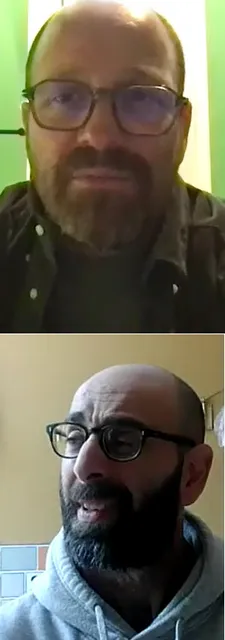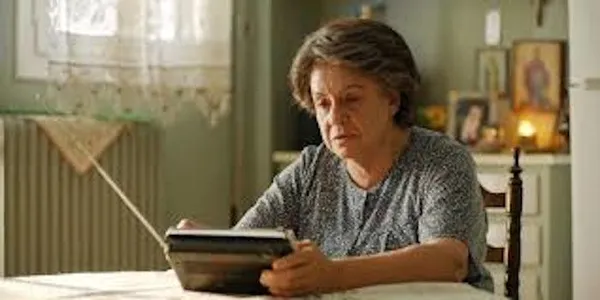Mother and son relationships, Greek society, bureaucracy and xenophobia are all satirised by tragicomic mockumentary Black Stone. Spiros Jacovides’ film - which was named Best Debut at Thessaloniki Film Festival in 2022 - and his co-writer Ziad Semaan have crafted an audience charmer that, for all its absurdity, gains a lot of emotional heft as it goes.
The story revolves around civil servant Panos (Achilleas Chariskos), who is conspicuous by his absence - both at work and at home. He stands accused of fraud and a documentary crew are on his tail but when they turn up to his home to investigate, his worried mum Haroula (Eleni Kokkidou) thinks they are reporters who are going to help her and immediately invites them in. Soon, this rag-tag assortment, which also includes Haroula’s older wheelchair-using son Lefteris (Julio George Katsis), co-opt the help of a taxi driver (Kevin Zans Ansong) among others and head off on an absurdist odyssey to find him.
The film will screen at London’s Genesis Cinema on May 7 and feature a Q&A with Jacovides and Semaan. The pair have known each other for 20 years and are already working on their next feature, which will be focused on a father and daughter relationship but, for this one, it was the matriarch who was key.
Jacovides says: “The first idea was the Greek mother. That's a very, that's a fascinating character. To both of us. Ziad lived in Greece until he was 18 or 20. I've lived all my life in Greece. So it's a character we've been observing. My mother wasn't a classic Greek mother and Ziad’s mother isn't even Greek. But you can't miss this character. She's everywhere. So that was how the whole thing began. And because she's such a tragic character in many ways, I thought of the mockumentary as a genre to break the drama to put the humour in, and to make it more accessible. So that was the reason we picked the mockumentary genre.”
 |
| Spiros Jacovides, top, and Ziad Semaan |
Semaan adds: “We both loved the mockumentary format. But then, it's become a bit of a standard in sitcom and TV storytelling, everything post The Office, which was groundbreaking. We wanted the humour, but we didn't want it to just become a sort of pastiche, of just jokes on the screen. But I think why it really worked wasn't intentional. We just like mockumentary, but in writing it more and more, I think it really worked because Haroula is the last person you'd expect - she doesn't understand what they're what they're making. So there's sort of a humour in her not even really understanding what she’s presented with.”
It was, however, important for the pair of them to retain the drama.
Jacovides adds: “A lot of documentaries out there are so farcical, I don't know why the genre went that way. But it was interesting to us to have a drama film with a lot of social satire, and you know, and a lot of themes in there. And trying to break those with the mockumentary.”
Given how important Haroula is to the film, the casting of Kokkidou in the role of the matriarch was crucial.
“We cast her first,” says Jacovides. “She's incredible. We cast her first and the movie was taking ages to get funding. And at some point, she said, ‘Guys, I can't commit to it’. And we started looking for another Haroula. And it was devastating, I was really depressed. And then I just said, ‘You know, there is no other Haroula. You have to do it’. And she did it. She was an excellent choice.”
Semaan adds: “There’s a Haroula ‘type’, but they come in different packages in Greece. One day when we were shooting through a Greek market, there was just a stream of them, one after the other, with their shopping trolleys full of vegetables. So even when we were writing, she was hard to imagine.”
Jacovides agrees: “It was very hard to imagine her, it's true because, he’s right, there's so many different types. My best friend's mother is a classic Haroula. We’ve been friends for 35 to 40 years, so I’ve been observing this woman forever. So she was very much based, in my mind, on this woman. But Eleni is an incredible actor. The way she works is that she observes a lot and she takes videos and pictures. She kept coming with different Haroulas she saw on the street she saw in a store, and she would study their body language, everything.”
The pair also pay tribute to the actors in general.
Semaan says: “I think in our scripts, they came across as kind of harsher, and sometimes funnier, and maybe a bit more comedic. In casting them, they became a lot more rounded and human and vulnerable.”
One of the themes the film tackles is xenophobia in Greece but the focus of the script is on how this stems from a place of fear rather than hatred.
Jacovides says: “The Greeks are not ideologically racist, and they're not historically racist. They are xenophobic, they're afraid. So it's total fear. It's interesting to me, because if it's xenophobia, if it's a phobia, you can eventually get over it. If it's an ideology, and it's something that passes from generation to generation, it's much harder to get over it and to get rid of it. So it was something that really interests me in Greece. With all the talk about Golden Dawn, the neo-Nazi party that was elected so many times in Greece. But you can see that these people who voted for the Golden Dawn, for example, they're not racist, they're just people who are functioning with their worst instincts, fear, anger, bitterness. It's a different situation than having people who are racist, historically and ideologically, and people who are just afraid of the new, the unknown, let's say.”
Looking to the future, Semaan says they’ve already started on their next project.
“We're working on the script now,” he adds. “And Spyros coming to London in a couple of weeks so we'll have a three-day kind of crash course in trying to write it all down and get funding going again.”
Spiros adds: “We're very excited about it. It's a father/daughter movie in this hardcore, patriarchal society, the Greek society. So it's really interesting and there is humour and there are ghosts. So I don’t know what it’s going to be in the end but it’s interesting.”
The starting point for the story is an unfinished concrete building - something the filmmakers note there is a lot of in Greece. So many, in fact, there’s a term for them, “yapi”.
“They’re everywhere in Greece,” says Jacovides. “And behind these buildings, there are crazy stories, you know, inheritances that have gone wrong. bankruptcies. So, that was the beginning of the idea, to make a story that's behind one of those unfinished buildings. So the title is Yapi, which doesn't mean anything in other languages. But I was thinking now, like a new working title, Concrete Dreams.”
Something to build on for the future.
Black Stone will screen at Genesis Cinema in London on May 7, including a Q&A with Jacovides and Semaan. Tickets and more information are available here






















